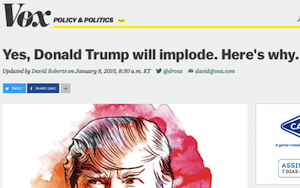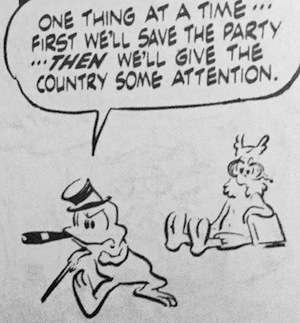The Perils of Political Forecasting
How to misread an election

Like everything else in politics, the rise of Donald Trump will look perfectly predictable in retrospect. Right now we're still in a rough patch, with many pundits still smarting from the shame of getting so many forecasts wrong, but once that passes we'll all be able to discuss this with the certainty that comes when you're talking about things that have already happened. If you could turn back the clock to last June, knowing what we know now, it wouldn't be hard to spin a story making the case that this crazy man on an escalator is actually on track to win the nomination. Why, it's all perfectly obvious!
Look, you could say. We all know there's a deep well of discontent in the Republican grassroots right now. That anti-establishment sentiment comes in many flavors and it can move people in different directions, but at a backlashy time like today it's easy to see it taking the shape of the nationalism that Trump is espousing. No, he's not a conventional candidate, but history surely shows that pop-culture figures are often able to leverage their fame into political success. And yes, the party leadership won't like it, but have you looked at Congress lately? The party leadership can't control squat anymore. They haven't even settled on a candidate of their own yet. Just watch. You'll see.
Sounds plausible now, because we know that's what happened. But you'll notice I didn't write anything like that when it really was June. I don't remember anyone writing that in June, though by summer's end there were reporters who recognized which way things were heading.
Full disclosure: I wasn't one of them. I'm pretty sure I avoided any foolishly public predictions about what was going to happen—the occasional Twitter wisecrack aside—but if you talk to any of the friends and relations who've asked me over the last year who I thought would win the party's nod, they'll tell you the only thing I said that panned out was the six-word warning I always inserted at the beginning: "I'm no good at political predictions." I made two mistakes early on that made me doubt Trump could clinch the nomination, and while I dropped the first one fairly quickly, I held onto the other for far too long.
The first mistake was pretty simple: Because I've always thought of Trump as a goofy blowhard, I carelessly assumed that almost everyone else did too. Then he zoomed up in the polls, and I saw that my impression of the man wasn't as widely shared as I thought. OK, out with that idea; I guess this guy can channel that grassroots discontent after all.

Mistake #2: I thought the party gatekeepers would be able to deny the nomination to someone they so disliked. Yes, the establishment had been having trouble keeping the base in line lately, but the presidential nomination process was its home turf, and I figured those fogies would be able to defend it. (Just look at how badly they routed the Tea Party insurgents four years ago.) Instead, as we all know, the old guard wasn't able to coalesce around a candidate until very late in the game—and not even then, really. And even if they had managed to pick someone as their champion early on (call him Jebscott Christio), it's not obvious to me now that this mystery candidate could've beaten Trump this year. For me, the biggest lesson of this primary season is just how weak the traditional centers of Republican power have become.
Well, now we know better: We really do live in a world where the alpha-male antihero of a post-Sopranos cable drama can be the GOP's presumptive nominee. If you predicted that future, I congratulate you. But not too heartily—you have to live in this timeline too.
Show Comments (59)